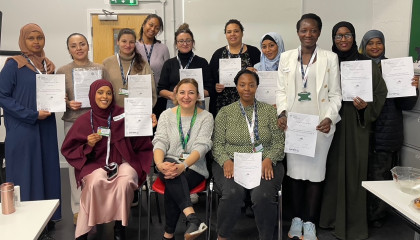You are here: Gender and pay: why having kids shouldn't mean a pay cut
breadcrumb navigation:
- Home /
- Gender and pay: why having kids shouldn't mean a pay cut

Gender and pay: why having kids shouldn't mean a pay cut
Claire Harding
16 August 2017
A new report by the Equality and Human Rights Commission finds that the UK's gender pay gap is stubborn and persistent: women earn less than men on almost all metrics, and the gender pay gap interacts with ethnicity and disability gaps. Overall, women earn 18 per cent less every hour they work than men.
The last two decades have seen welcome reductions in the gender pay gap, driven in part by young women being increasingly likely to go to university. For male and female graduates, the gender pay gap in the years immediately following graduation is fairly small. The gap widens through the lifecycle, driven in part by women being more likely to work part time after having children.
Part time employees of both genders consistently earn less than full time employees: women in the middle of the income distribution who work part time earn £2.60 an hour less than those who work full time, and this part time/full time gap has widened in recent years. We know that there are many people working part time who would prefer to be working full time, as well as people who are struggling to find part time work that matches their skills and experience. If we only compare women working full time to men working full time, the gender pay gap halves.
Women are more likely to work part time and take career breaks because tend to take on the bulk of childcare. Having a child can have a direct and immediate impact on women's employment - thousands of women every year are sacked or forced out of a job because they are pregnant, and others report being passed over for pay rises or promotions while they are on maternity leave. When women return to the workplace, they often find it difficult to find a part time job which even approaches their salary and seniority in their previous full time role, and they may face negative perceptions of their capability and commitment simply because they are a mother. Men don’t seem to experience the same problems – there is some evidence that men’s salaries tend to improve when they have children.
The Equality and Human Rights Commission is calling for better childcare and a ‘use it or lose it’ element of dad’s leave, both designed to make it easier for women to work and men to care. They also suggest that more jobs are offered flexibly to reduce the part time/full time gap and enable more people to work in jobs that fit around their childcare responsibilities, other caring needs, or needs associated with a disability or health need.
These suggestions are welcome and sensible. It is also important to remember that the need for childcare doesn’t end when children start school: many families find managing breakfast clubs, after school clubs and holiday childcare, plus the need to support children during school transitions and exam periods, even more difficult than navigating nurseries and childminders. This may be part of the reason that the gender pay gap actually widens as women get older. Beyond the focus on early years childcare, employers and governments need to make sure that parents and carers at every stage can find high quality works which fits their skills and their families’ needs.

More from our blog
Parent Champions Conference and Awards 2025
What a fantastic two days at the Parent Champions Conference and Awards 2025!
The Exciting Story Of The First Year Of Books Together
The Exciting Story of Books Together
The NAFIS Conference and Awards 2024
Read about the NAFIS Conference and Awards 2024
Sign up to our newsletter
Get the latest news, research and resources from Coram Family and Childcare



